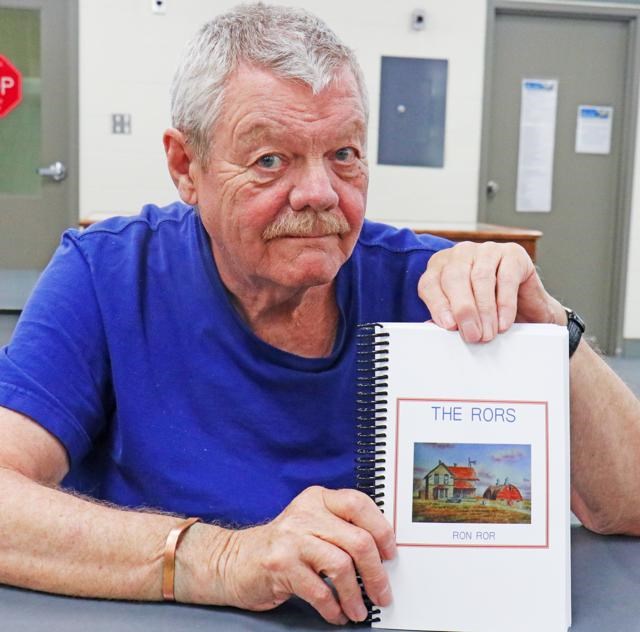Weyburn writer Ron Ror has finished a four-year writing project, called ŌĆ£The RorsŌĆØ, a multi-generational series of family stories which he has fictionalized into an epic tale.
ŌĆ£The people are real, but the dialogue is made up. It covers three generations, starting in Sweden, then it goes to Minnesota, then they moved to this part of the world,ŌĆØ explained Ror, noting the incidents and stories are all real, but not knowing how an event transpired he fictionalized the story around it.
He wrote the tale of the three generations in three books, with eight chapters in each volume, and each chapter is told from the point-of-view of one character.
ŌĆ£I trained as an actor at the National Theatre School in Montreal, and I loved to create different characters. I know a little bit about these characters, but not enough to write a whole book about them. I took the facts and played with them, and gave them their own voice so each character is an individual,ŌĆØ said Ror, adding he very much enjoyed this aspect of the writing.
Chronologically, the story begins in Sweden where the family made a living as fishermen, but with large companies moving in, the smaller fishermen were bumped out, so they made the decision to immigrate to the United States.
They booked passage on the ship SS Romeo, which was kept busy taking immigrants across the ocean to New York City, in the year 1888. After docking in the south end of Manhattan, they took a horse and buggy to Grand Central Station, and caught a train from there to Minnesota to homestead on land that their relatives claimed for them.
After some hardships, including when the mother died in childbirth and after one of her sons died in a lumber camp accident at the age of 17, RonŌĆÖs grandfather, David, decided to explore Canada, where word came of land being given away.
ŌĆ£It was becoming obvious there wasnŌĆÖt much land left in Minnesota to share, and the acreage they had wasnŌĆÖt going to be enough to feed their entire family,ŌĆØ said Ror, noting they ended up homesteading land located halfway between Halbrite and Goodwater.
ŌĆ£One of the things I really enjoyed is they didnŌĆÖt stay in one place much, they roamed all over the place,ŌĆØ said Ror, noting the southeast area locations in the book include Weyburn, Goodwater, Halbrite, Midale, Maxim, Radville and the little town of Neptune, which no longer exists, along with locations all across Canada.
ŌĆ£David, my grandfather, was quite a character. He gets three chapters. He wasnŌĆÖt very popular, but he got things done,ŌĆØ said Ror.
One of the stories about David was being one of the first to have a big steam tractor and threshing machine in the area for harvesting. It operated for about 12 years or so before smaller, cheaper tractors came along that were more generally available to the local farmers.
Ror spent about four years altogether pulling together all of the stories and materials for the book, including mining local histories (such as for Lomond, Lake Alma and Radville) as well as spending hours talking to family members, such as Eugene Ror, a cousin of his fatherŌĆÖs who he had never met before.
ŌĆ£The problem with history is itŌĆÖs all fiction, in my opinion. TheyŌĆÖre going to tell the story the best way they know how, but once they get to telling the story, theyŌĆÖre not too keen on staying with the facts,ŌĆØ said Ror.
The book is 450 pages long, with a couple of pages of photos included with each of the three sections. It was initially published online, but Ror realized the story would mainly be of interest to older people, and theyŌĆÖre not likely to curl up by the fireplace with a computer to read it.
He is making copies of the book available for $15 each, and he will gladly deliver it within Weyburn city limits. For those outside of the city, he will make arrangements to get the book to them.
HeŌĆÖs hoping to be able to do an author reading at the library, possibly in the fall when the COVID restrictions are gone.
To obtain a copy of the book, phone him at 306-842-1075.




